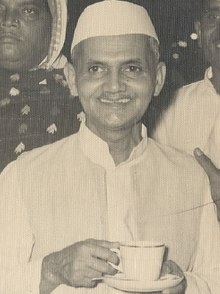
On Oct 2, 1963, at Rajhgat when Jawarharlal Nehru asked Lal Bahadur Shahstri, “I hear today is your birthday”? Shahtriji’s reply was “Today was birthday of Gandhiji, and hence it is not only mine but everyone’s birthday.”
Lal Bahadur Shastri was known for his endearing characteristics of utter simplicity – simplicity of thought, word and deed. Before becoming a Prime Minister (1964-66), Shastriji held numerous important ministries in the government. He was deeply influenced by Gandhiji and as a political leader he stood for truth and non-violence.
As soon as he took the role of Prime Ministership, he had to face war with Pakistan in 1965. With just two years in power and faced with war with Pakistan, his contribution for the development of the country is commendable which is felt even today. Some of his notable contribution are:
White revolution – He promoted the national campaign to increase the production and supply of milk. He met Verghese Kurien, then the General Manager of Kaira District Co-operative Milk Producers’ Union Ltd (Amul) and discussed his wish to replicate this model to other parts of the country. He wanted to improve the socio-economic conditions of farmers. As a result of this visit, the National Dairy Development Board (NDDB) was established at Anand in 1965.
Green revolution: Soon after Shastri took over the Prime Ministership of India after Nehru’s death, India was attacked by Pakistan. At the same time there was scarcity of food grains in the country. To address the food shortage problem, in 1965 he gave a slogan “Jai Jawan Jai Kissan” at a public gathering at Ramlila Maidan, Delhi. He promoted Green Revolution to increase food grain production in India and to reduce dependence on imports. The result of this was it led to an increase in food grain production, especially in Punjab, Haryana, and Uttar Pradesh. Significant steps undertaken during this time were the development of high-yielding varieties of wheat, and rust resistant strains of wheat.
Unlike Gandhiji, Shastriji was a secularist who refused to mix religion with politics. In a public meeting held at the Ram Lila grounds in Delhi, a few days after the ceasefire, he complained against a BBC report which claimed that Shastri’s identity as a Hindu meant that he was ready for a war with Pakistan. He stated:
“While I am a Hindu, Mir Mushtaq who is presiding over this meeting is a Muslim. Mr. Frank Anthony who has addressed you is a Christian. There are also Sikhs and Parsis here. The unique thing about our country is that we have Hindus, Muslims, Christians, Sikhs, Parsis and people of all other religions. We have temples and mosques, gurdwaras and churches. But we do not bring all this into politics. This is the difference between India and Pakistan. Whereas Pakistan proclaims herself to be an Islamic State and uses religion as a political factor, we Indians have the freedom to follow whatever religion we may choose, and worship in any way we please. So far as politics is concerned, each of us is as much an Indian as the other.” (wikipedia)
He was known for his honesty and humility. He was posthumously awarded the Bharat Ratna. In Delhi, a memorial “Vijay Ghat” was built for him.
Source: Wikipedia
Book: Days with Lal Bahadur Shastri, glimpses from the last seven years, Rajeshwar Prasad

